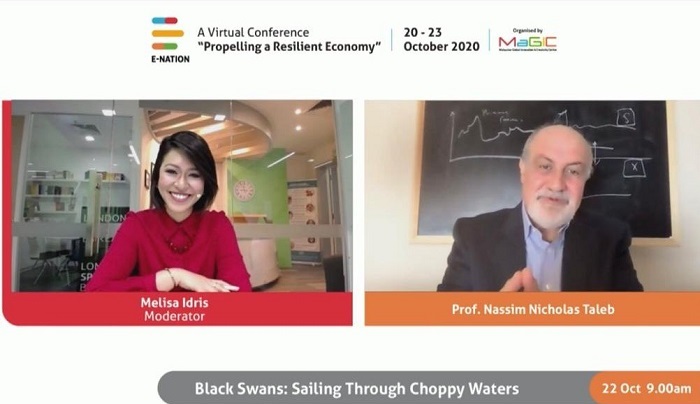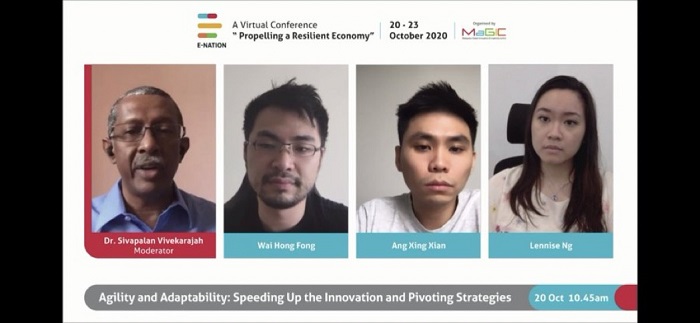Any which way you look at it, E-Nation 2020, rocked
By Digital News Asia November 24, 2020
- MaGIC CEO: Ensured that quality and relevance of content was our top priority
- Key to ask crazy questions because before a breakthrough comes the crazy idea

It can be tricky to gauge the effectiveness and impact of online conferences which lack the high touch element and that opportunity for a chance discussion that can lead to unexpected collaborations or partnerships.
But as the “Thank You” email from Dzuleira Abu Bakar (pic, below), CEO of Malaysian Global Innovation & Creativity Centre started making its way to the various role players involved in the recently ended, E-Nation 2020 conference, it became clear that the MaGIC had hit a home run with the conference.
.jpg) Dzuleira’s email struck a chord with e-Nation 2020 participants when she declared the event “a phenomenal success”. Attracting over 3,500 attendees consisting of policy makers, technology and innovation enthusiasts, corporate leaders, tech entrepreneurs as well as students,” the MaGIC CEO was clearly elated at how well things went.
Dzuleira’s email struck a chord with e-Nation 2020 participants when she declared the event “a phenomenal success”. Attracting over 3,500 attendees consisting of policy makers, technology and innovation enthusiasts, corporate leaders, tech entrepreneurs as well as students,” the MaGIC CEO was clearly elated at how well things went.
“Frankly the response was overwhelming. It was heart-warming and gratifying to learn how much it has benefitted participants,” she tells DNA. This made all the hard work put in worthwhile as from Day 1 of E-Nation’s planning, she says, “we made sure that quality and relevance of content was top priority. We needed to ensure delivery was engaging yet at the same time not causing virtual fatigue.”
Design matters too and she shares that, in addition to the quality of content and speakers, MaGIC received credit for the look and feel of its E-Nation platform and app layout, which was easy to navigate making the virtual conference an enjoyable and insightful one.
“Overall it was a meaningful experience for us at MaGIC, to planning and delivering a mass knowledge sharing benefiting the entire Malaysian ecosystem for four whole days!”
For those who did not catch the conference, here are some key insights from four of the panel sessions.
Keynote: The future is faster than you think
“The challenge we have today is that we’re living in a world where our brains are not designed to understand the rate of change,” began Peter H. Diamandis (main pic), the executive chairman of the XPRIZE Foundation, in his keynote titled “The Future is Faster than You Think.” We’re living in a world that’s changing month to month, and exponential increase in computational power will mean that businesses that can’t adapt will be left behind.
It is thus important to look at one’s own product, service and industry through a framework where when something first gets digitised, it enters a period of “slow, deceptive growth.” But as it doubles in capabilities over the years, it will become disruptive. Digitisation will lead to demonetisation, which in turn leads to democratisation.
So, at the end of the day, Diamandis says that it’s critically important to “ask crazy questions”, because “before anything is a breakthrough, it was a crazy idea.”
He identifies a few meta-trends to take note: that everyone will be connected (5G being another catalyst); and that everything will be connected (IoT and sensors), which leads to an explosion of data that leads us into “the world of perfect knowledge.”
Here, Diamandis believes that the question one has is far more important that what one knows. Businesses will be able to use AI to ask powerful questions that put them ahead, and the future is one of human-AI collaboration, where our mission is to “automate the routine and humanise the exceptional.”
Diamandis concludes that “a negative mind will never give you a positive life”, and that “the world’s biggest problems are the world’s biggest opportunities.” Covid-19 may be despairing, but it’s also a chance to change the world.

Black Swans: Sailing through choppy waters
“The black swan effect” is the termed coined by Professor Nassim Nicholas Taleb, risk expert and New York Time’s bestseller, to describe events that are rare, unpredictable and catastrophic. In his E-Nation 2020 panel, the esteemed scholar and mathematical statistician says that the Covid-19 pandemic is not a “black swan.”
“There have been 72 pandemics recorded in history. It’s not that rare of an event,” he says. There were even quarantine rules in place during 14th century Venice, where ships arriving from infected ports were required to drop anchor for 40 days before landing.
While the effects have been catastrophic, the speed of the pandemic’s spread is not wholly unpredictable, as Nassim argues. Today’s world is highly connected, where Google can be far-reaching and where South Korean superstars can be international. The same environment, however, spreads infections faster.
What are the actual black swans of recent history? Nassim says the two World Wars and their impact can’t be predicted. Google’s advent is another.
But volatility isn’t entirely bad. In explaining the concept of “antifragility”, Nassim says that sectors affected by stressors can become more resilient in time. “A good sector is one that gets better after experiencing trouble,” he says. Tech, for instance, became stronger after the dotcom bubble.
Covid-19, thus, is a stressor that can help some countries and businesses grow stronger. “Failure is not bad, the problem is that people end up failing too late.” The idea of “antifragile” is to make failure small and the gains big.

Piloting the Digital Future: Advancing countries, companies and communities
Michael Yeoh steered a roundtable conversation between Tony Fernandes (Executive Director & CEO, AirAsia Group), Mohd Khairil Abdullah (CEO, Axiata Digital Services), and Marc Woo (Country Head, Google Malaysia), as they encouraged Malaysian entrepreneurs to continue innovating despite the uncertainties that Covid-19 brings.
Tony points out that AirAsia has technically been a digital company since its inception, saying "We've set ourselves up from 19 years ago, (with) an ability to read money in this digital world, and our secret sauce is our relationship with our customers and our data." Meanwhile, Khairil stresses the need for Malaysian businesses to stay innovative by putting "learning, innovation and experimentation as a critical discipline," in order to create "an organizational DNA that promotes experimentation".
Woo then points out that talent is crucial for any sort of innovation to succeed, and that Malaysian companies need world-class talent to market themselves on the global stage. The panel also notes that Malaysia needs to digitise all facets of its economy (especially e-commerce and fintech), including government processes, and international linkages (especially within ASEAN).
Additionally, a lot of venture capital funding overlooks Malaysia in favour of Singapore (better ecosystem) and Indonesia (larger market), resulting in an undervaluation of Malaysian companies. Certainly, companies must step up and make the change, with Woo concluding, "Insanity is doing the same things and expecting different results. In this new norm, insanity is doing the same things, and expecting the same results".

Agility and Adaptability: Speeding up the innovation and pivoting strategies
In a panel moderated by Dr Sivapalan Vivekarajah, cofounder and Senior Partner, ScaleUp Malaysia Accelerator, the point came up about how Covid-19 was changing the business world. To this, Fong Wai Hong, cofounder and chieftain of Storehub highlighted how Covid-19 has accelerated the digital trend and his observation that it confers an unfair advantage on those who are more prepared to go digital.
Interestingly it also triggered a mindset change among GenX or “the uncles and aunties” as he referred to them. This group is now embracing digital payments and platforms where before they would think it was not suitable for them.
Taking this further, Lennise Ng, CEO and cofounder of Dropee reflects on the heavy responsibility that tech companies bear in their efforts to increase the digital maturity of both Malaysian companies and the country itself, saying, “We have a huge responsibility to help non tech savvy entrepreneurs adopt digital solutions in an easier, cheaper and faster manner.”
The economic squeeze also caused Lennise and Fong to look harder within the business for opportunities to deliver better value to customers and it was no different for Ang Xing Xian, cofounder and CEO of CapBay, which is a multi-bank supply chain finance and peer-to-peer financing (P2P) platform.
With no early payments to finance for SMEs during the early period of the lock-down, CapBay discovered a group of SMEs that still had business – those servicing the government. But payments to them had slowed down with government officers working remotely. CapBay stepped in to help these SMEs tide over their cash flow difficulties.
It was no surprise then to hear panel moderator, Sivapalan highlight in his closing remarks on the importance of increasing value to customers in tough times. “The key take-away here seems that, whether it is Covid-related or not, in tough times, companies that can adapt, are agile and can look after their customers, will continue to do well.” It is not about the external environment, he stresses, “It is all about you as CEO and how you manage change because even in tough times, there are opportunities to be seized.”
Those are words all entrepreneurs must take to heart.


